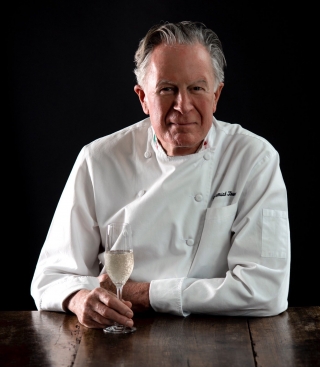
A Towering CAFÉ Talks Podcast
03 December 2020Listen to legendary Chef Jeremiah Tower describe the lessons he learned moving from chef to restauranteur to ring master. Also, hear his ideas on the need for an “Einstein moment” in the restaurant industry.
By Lisa Parrish, GMC Editor
CAFÉ Talks recently shared its microphone with legendary chef and restauranteur Jeremiah Tower. His hard-earned wisdom serves as inspiration to culinarians making a career in the foodservice industry.
The restaurant language
Chef Tower only requires one item to ascertain a restaurant’s quality, the chef’s courage, who dines in the establishment, where the restaurant is located and what time of year it is. All this information is communicated whether someone is standing outside its doors or is located halfway around the globe. That one item is the menu.
Chef Tower explains, “A menu is a chef’s method of communication. It’s a language.” He said a menu should be a reflection of what the chef thinks rather than an expression of what dishes will sell well.
Another expression of a restaurant is its style, which defines the restaurant owner or chef. “Anything worth doing is worth doing with style,” Chef Tower said. He explained that style is an extra push that arouses another’s intellect and amusement. Style is well more than proficient and finesse. He said that it takes eccentricity to make style.
Chef Tower lamented the loss of style in today’s hospitality industry. “I can go into any hotel in the US and I can tell there is no leader or manager trying. There is no individuality on fire. Hotels have lost that electricity,” he said.
From chef to restaurateur to ring master
Bridging the gap between chef owner and restauranteur is one of the characteristics that made Chef Tower famous in the foodservice industry. Nowhere was this transition more apparent than at Chef Tower’s San Francisco Stars restaurant. He created an atmosphere of teamwork, electricity and an experience that was more than about a good meal. “I treated everyone equally. I put the first female behind the bar in San Francisco. I made the bar equally as important as the kitchen,” he said.
He likened his restaurant position to that of a circus ring master. “As a ring master you bring as much theater as you can.” He used an example from a night at Stars that was packed with diners to illustrate his point. A naked homeless man burst through the front door and was running toward the back door. While everyone was looking, Chef Tower stopped the man and announced that he should have a glass of champagne. All the diners got up and started cheering as the startled streaker ran for the backdoor. “This disruption would have caused many people to get pissed off. That’s a ring master,” he said.
Elegant simplicity is how Chef Tower describes his approach to food. He explains a chef should go to the market, see what is exciting and that will dictate the menu. “Chefs should stand behind the ingredients. Simplicity is not simple minded. Simplicity is the courage to let whatever you are doing be the real focal point. It’s not the chef standing there saying look at me,” he explained.
He also admitted that simplicity is hard to do perfectly.
An “Einstein moment” to save the day
When asked how the restaurant industry will survive the worldwide pandemic, the chef reasoned that the world needed “another Einstein moment.” He suggested this moment will be created by brilliant people from Silicon Valley, who have become billionaires from selling their technology to the restaurant industry as well as others. “It’s payback time,” he explained. Chef Tower believes the current restaurant problem will take more than just the foodservice industry to figure out and needs both technical expertise and funding from people the likes of Steve Jobs or Jeff Bezos.
GMC has featured these stories focusing on previous CAFÉ Talks Podcast interviewees.
Culinary Educator and a Flavorist: Discover what it takes to become a flavorist and ideas about retooling culinary education post COVID-19.
The Ethnicity of Soul Food: Chef Keith Taylor talks about subjects ranging from the ethnicity of soul food, to a restauranteur’s core values to setting a career destination in the next installment of CAFÉ Talks Podcast.
CAFÉ Talks Podcast: New CAFÉ Talks podcast educates, enlightens, entertains and rewards listeners with the best of the culinary industry. First four episodes feature Mary Petersen, John Folse, Drew Nieporent and Jack Uldrich.
